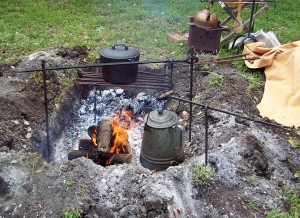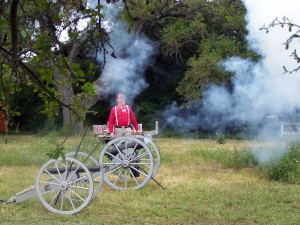
The Tiniest Santa-dressed Dog of Them All
The long pre-Christmas market marathon is finally complete – this last weekend was our last event, and possibly the most strenuous, involving as it did two days in Boerne (three, if you count set-up on Friday afternoon), with the pink pavilion and all the gear – the tables, display racks, two strings of Christmas lights and an extension cord – not to mention my books and my daughter’s origami earrings and bead bracelets. We have had a market event every weekend since early November, save for the weekend after Thanksgiving, so our state of exhaustion is nearly total. This was compounded (1) by both of us having caught (in sequence) a filthy cold/cough/flu and (2) a mid-week overnight trip to Brownsville to tend to the project of one of the Tiny Publishing Bidness’ clients. The client covered the costs of the hotel stay and gas, and treated us to a perfectly magnificent lunch at an Argentine steakhouse, so there is that. But my daughter felt perfectly awful for one week, and then the cold hit me on the return from Brownsville and I have been barely able to function ever since. Monday was the first day that I could really succumb to how awful I felt, and crawl into bed for much of the morning. Until some robocaller (curses be on their head this Christmas season, and all their stockings be filled with lumps of coal) on the cellie woke me up and set the doggles to barking about mid-afternoon.
Anyway – now that I am feeling slightly better – here’s a wrap-up of my observations of the holiday season. I avoided all malls, and big box stores, by the way. Our Black Friday shopping was all on-line, for items of quality (books and specialty foods, mostly) to be sent by mail to dear family members. I would not be surprised to learn that such is the case with many other shoppers this year. I would also not be surprised to learn that people are being very careful with their purses and credit cards, when it comes to Christmas shopping. I’ve been tracking sales of my own books at direct marketing holiday events since 2009, and there has been a definite dip in sales this year and in 2015 over previous years. I noticed also that sales deals offered via email with regard to Black Friday, and the week after have been extended, and extended again.
People seem quite defiant in the way they say “Merry Christmas!” to each other; not so much the carefully non-denominational “Happy Holidays.” No, it’s “Merry Christmas!” out loud and proud. And I have noticed that my neighbors have been particularly assiduous in decorating their houses and gardens with lights, inflatables and outsized Christmas ornaments this year … and in exchanging small gifts between neighbors. We gave small boxes of home made gourmet fudge to those whom we know best, and also to the mailman, local firehouse, the nearest police station, the guy who drives the garbage collection van, and the staff at the bank branch where we do business … and have received in return a wealth of thanks and good wishes, as well as a pound of home-smoked pork chops, a bottle of red wine and a pair of replica Indian arrows, fletched with buzzard feathers and tipped with points made from bits of sharpened deer antlers … yes, we have neighbors with interesting hobbies.
There is in the air, I sense, a determination to have a Merry Christmas in spite of it all … threatened riots in certain cities, the pall of terrorism and crime, of political turmoil, a worsening economic situation, and the smothering hand of political correctitude, a bright flame against the threatening darkness. Merry Christmas, indeed.










Recent Comments